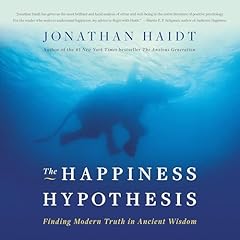
Feeling Smart
Why Our Emotions Are More Rational Than We Think
No se pudo agregar al carrito
Add to Cart failed.
Error al Agregar a Lista de Deseos.
Error al eliminar de la lista de deseos.
Error al añadir a tu biblioteca
Error al seguir el podcast
Error al dejar de seguir el podcast
 Exclusivo para miembros Prime: ¿Nuevo en Audible? Obtén 2 audiolibros gratis con tu prueba.
Exclusivo para miembros Prime: ¿Nuevo en Audible? Obtén 2 audiolibros gratis con tu prueba.Compra ahora por $20.56
-
Narrado por:
-
Sean Pratt
-
De:
-
Eyal Winter
Distinguished authors like Daniel Kahneman, Dan Ariely, and Nassim Nicholas Taleb have written much about the flaws in the human brain when it comes time to make a decision. Our intuitions and passions frequently fail us, leading to outcomes we don't want. In this audiobook, Eyal Winter, Professor of Economics and Director of the Center for the Study of Rationality at the Hebrew University of Jerusalem, wonders: why? If our emotions are so destructive and unreliable, why has evolution left us with them? The answer is that, even though they may not behave in a purely logical manner, our emotions frequently lead us to better, safer, more optimal outcomes. In fact, as Winter discovers, there is often logic in emotion, and emotion in logic. For instance, many mutually beneficial commitments - such as marriage, or being a member of a team - are only possible when underscored by emotion rather than deliberate thought. The difference between pleasurable music and bad noise is mathematically precise; yet it is also the result of evolution. And our inherent overconfidence - the mathematically impossible fact that most people see themselves as above average - affords us advantages in competing for things we benefit from, like food and money and romance. Other subjects illuminated in the book include the rationality of seemingly illogical feelings like trust, anger, shame, ego, and generosity. Already a best-seller in Israel, Feeling Smart brings together game theory, evolution, and behavioral science to produce a surprising and very persuasive defense of how we think, even when we don't.
©2014 Eyal Winter (P)2014 Gildan Media LLCLos oyentes también disfrutaron:




















Reseñas de la Crítica
Interesting subject but tiring listenig.
Se ha producido un error. Vuelve a intentarlo dentro de unos minutos.
Would you listen to Feeling Smart again? Why?
I would have to to get more out of it. The structure starts off good, but the latter end runs on like a reference or collection of topics. Not that it is a bad thing, fans of David McRaney, author of You Are Not So Smart and You Are Now Less Dumb, will really find this book enjoyable.Would you recommend Feeling Smart to your friends? Why or why not?
Yes, once again fans of David McRaney, Dan Ariely, Mathew Lieberman, Carol Tavris, Elliot Aronson, Nassim Taleb, Dr Novella etc.......... would all enjoy the a-book.Anyone wanting an evidence based approach to these topics will find a litany of peer-reviewed experiments cited throughout.
Have you listened to any of Sean Pratt’s other performances before? How does this one compare?
Yeah I've listened to him read more books than I could remember to type in this box.... he never disappoints and always seem to deliver the appropriate emphasis.Did you have an extreme reaction to this book? Did it make you laugh or cry?
I did find his theory fascinating, in so much that at the level of the brain, there is very little, if any separation of rational thought and emotional thought. Definitely cool stuff.Any additional comments?
Only had one major disagreement with his thesis. In Winters chapter on love and sexual relationships, he makes mention of sperm competition in OTHER species, but fails to adequately address the presence of those features in humans, our primate cousins and our ancestors. This of course calls into question the application of his theory to sexual emotions. Perhaps he considers it more of a vestigial trait, and perhaps its the political/social context of the author though, he works at an Israeli university.A brilliant marraige of various psych sciences!
Se ha producido un error. Vuelve a intentarlo dentro de unos minutos.
Not great
Se ha producido un error. Vuelve a intentarlo dentro de unos minutos.


